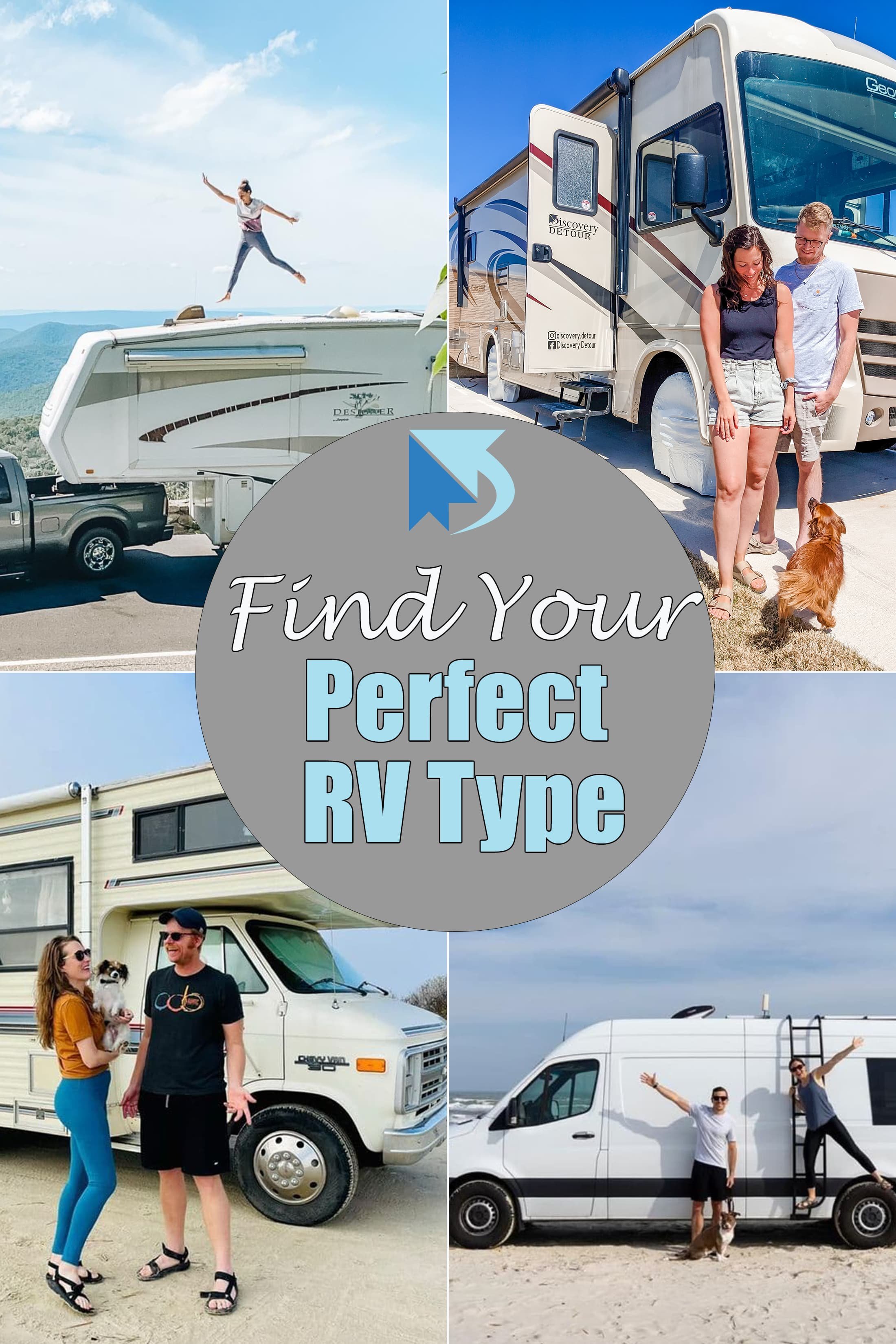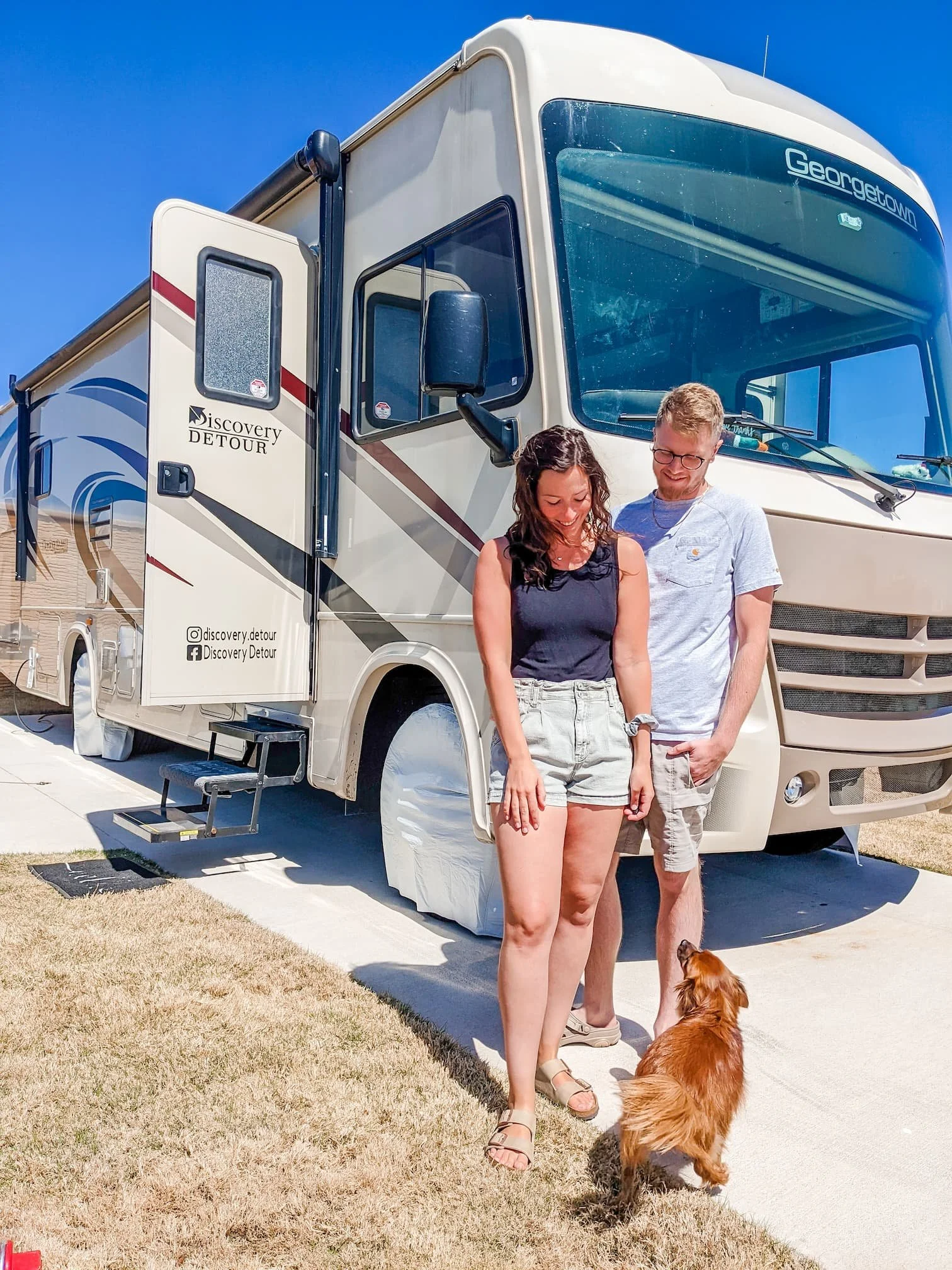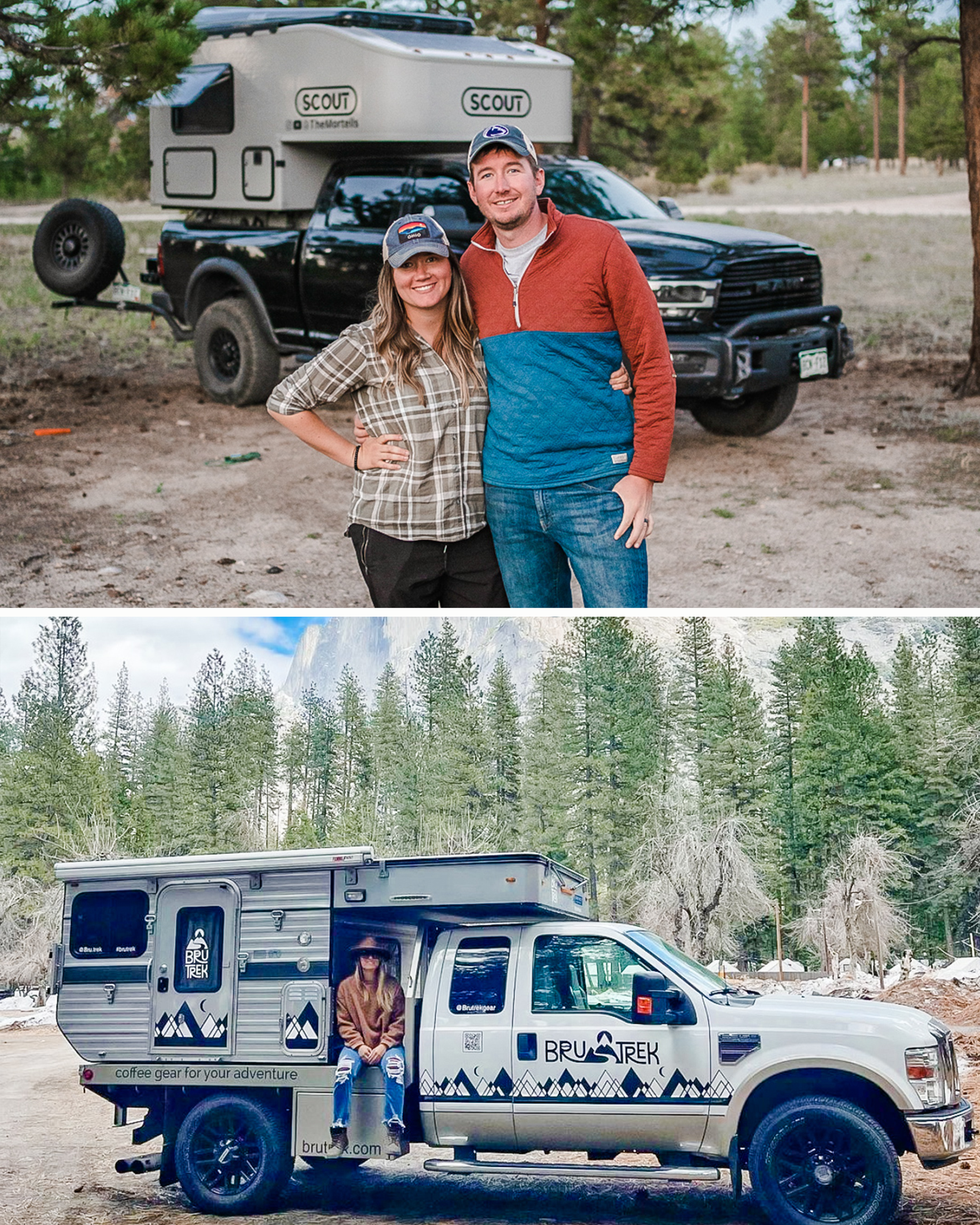Discover Which RV is Right For You [Buying Guide and Quiz]
This post may contain affiliate links where I earn a small commission when you make a purchase using the links at no additional cost to you.
📍-Your Dream Home-on-Wheels
If you’ve been looking into buying an RV, chances are that you have fallen down a research rabbit hole. With the expansive range of RVs to choose from, covering a broad scale of sizes, cost, and accessibility, RV shopping can become overwhelming very quickly. And while it is true that there is no such thing as a perfect camper, all of these options means that with the right preparation, you will be able to find the perfect camper for YOU.
Since you’ve already found your way to this guide, let me tell you the good news: the hard part is over! I’ll take it from here, giving you a comprehensive guide to the types of campers that are out available, and we’ll finish it off with a quiz to help steer you toward the home-on-wheels that is right for you, your family, and your plans.
Read on, and we’ll crawl out of this rabbit hole together.
Class A Motorhomes
We are partial to the Class A because we have been living and traveling in one for 8 months now! You can follow our journey over on Instagram.
Class A Motorhomes are some of the largest motorized campers that you will see on the road. Their body structure looks similar to commercial buses because they are built using the same framing and construction. Their large body size means they usually lend their owners a lot of comfort, spacious living areas, room for additional amenities (I see you full sized fridges!), and loads of storage. Because they are motorized themselves and don’t need to be towed, they are considered relatively easy to park, drive, and set up camp with. If you travel with your family, you can rest easy knowing that everyone will have a comfortable seat and easy access to the cabin bathroom and fridge throughout long journeys.
If you spend a lot of your time out on the town, you should consider towing a vehicle with this RV type, so that you can run errands while leaving your base camp stationary.
Because of these perks, Class As can be one of the most expensive RVs on the market, ranging from $50,000 - $300,000+. If you’re interested in buying a Class A RV, you can opt for a gas engine rather than diesel, which will save you a lot of money on the motorhome’s sticker price. While diesel engines tend to run for more miles and be a bit more fuel efficient, gas ones are far cheaper.
Class C Motorhomes
Similar to Class A Motorhomes, Class Cs are motorized campers and can drive themselves instead of being towed behind another vehicle. This means that they share similar perks to Class As such as being relatively easy to drive, park and set-up camp with while also giving passengers the added luxury of being able to access the restroom while on long travel days. The major difference between Class As and Cs is that Class Cs are built on a truck frame. They are noted for their characteristic sleeping area above the driver’s cabin and can offer a similar experience to Class A camping. As an added bonus, they are often noted as being more fuel efficient than Class As.
It should be noted that their smaller frame usually means fewer amenities, less storage and a reflective lower price point. If you want something that’s comfortable to live in and easy to move, but a Class A is out of your price range, Class Cs are your next best bet.
Class B Campervans
The smallest of our motorized campers is the Class B motorhome, otherwise known as the campervan. Ready to roll at a moment's notice, you sacrifice size for maneuverability with this type of RV. Because they are so compact and easy to drive, these types of campers are ideal for remote and off-the-grid camping excursions and will allow you to access scenic destinations that you just wouldn’t be able to in a larger camper. They’re more efficient on fuel, and are thoughtfully designed to utilize every single square inch of space inside them. Many of them have full bathrooms, showers, fridges, and full sized beds!
One drawback with having a camper van is that your tank sizes will automatically be cut to a portion of what you can get in a Class A or Class C Motorhome. This means you will seriously be required to limit your water usage or have to make frequent trips to the dump station. To fit everything inside, you will most likely have to convert your bed every morning in order to access your table or kitchen area, and since most Class Bs can’t tow another vehicle, you’ll have to take the whole van with you every time you run an errand. Most surprisingly, campervans do not follow the pre-established trend with smaller sizes equaling smaller price points. Because of the thought and engineering required to fit everything into its small frame, Class Bs can cost you upwards of $90,000! Of course, constructing your own van is becoming increasingly popular which will allow you to supplement the sticker price with your time.
Truck Campers
Truck Campers are actually quite versatile. Mike and Dani Mortell (top), are using theirs for full-time living while Brina Maydock from BruTrek (bottom) runs a business out of her truck camper, selling adventure worthy coffee merchandise on the road! Follow their quests through Instagram (The Mortells, BruTrek Rig).
Truck Campers are one of the most unique RVs out there, also being one of the least common. A truck camper is one that rests inside of the bed of a truck. It shares a surprising number of similarities to campervans with expertly designed living spaces which fit more than you would expect in a very small space. As an added bonus, because you can put this on the truck of your choice, choosing a tough 4x4 vehicle will give you even more accessibility to make it down rugged terrain than even the campervan can’t provide. They also require little to no preparation when packing up camp. As you may expect, these are one of the most economic ways to enter into the RV scene, with a new truck camper costing as little as $8,000.
Of course, what you gain with ease, you lose with space, storage, and tank sizes, and since your driving space isn’t connected to your living space, are not able to access your kitchen and bathroom during travel. In addition, if you ever wish to detach your camper from your truck, this can be a tricky and time consuming process.
Travel Trailers
Because of their sleek design and high quality craftsmanship, Airstreams are one of the most popular brand of travel trailer. These guys even use it as home base for their shopping and styling service, Saavy Styles. Follow their journey on Instagram!
Continuing on with our tow behind theme, I introduce to you the popular travel trailer. The fantastic thing about travel trailers is that they come in all shapes and sizes to fit your need, group size, and lifestyle, ranging from tiny jelly-bean shaped models, to massive spaces designed to host a large family in luxury.
As the most popular non-motorized type of RV, the term “travel trailer” technically categorizes a number of subsets such as teardrop trailers, fifth wheels, and toy haulers. Since each of these will offer their own benefits and drawbacks, I have included separate information sections about each of them down below.
A standard travel trailer will have comfortable living space, but less storage than what you may find on a Class A or Class C motorhome. Since they are towed behind another vehicle, there is a steeper learning curve when figuring out how to back them up and park them. Unless your a speed demon, they usually take longer to set up as well because of the added time that must be invested into unhook the towing vehicle. Unlike motorhomes, travel trailers typically aren’t sold with onboard generators and are streamlined to be utilized at an RV park or resort, rather than a boondocking spot with no hook-ups. They are a great starting point for someone who wants to camp without feeling like they’re camping, and will cost you anywhere in the ballpark of $10,000 - $35,000.
Teardrop Trailers
Can you see why they’re called teardrops? These babies have all the essentials in a tiny package. Image by Donald Giannatti
One of my favorite types of campers, if for nothing else than the fact that they are adorable, is the compact teardrop trailer. Besides the cuteness factor coming into play here, teardrops are small enough to fit into a garage, lightweight enough to be towed by most vehicles, budget friendly, and are easy to tow and maneuver. They are ideal for minimalists and outdoor lovers who are traveling solo or as a couple, because the storage and living space in these is basically as small as it can get.
Teardrops often do not include a bathroom or kitchen, although they will occasionally have a small sink. You can expect these to include a comfy bed, a small amount of storage for personal belongings and food, and a sturdy roof that will keep you dry and warm when the weather just won’t cooperate. In my opinion, this beats tent camping on the hard ground any day of the week.
Fifth Wheels
Joe and Kalyn from Open Roading travel full-time (with bunnies) in their fifth wheel! You can follow their journey through Instagram!
A fifth wheel is a type of tow behind trailer that has a characteristic and prominent overhang which extends over the bed of the towing truck and gives the camper added stability while towing. They are very popular among full-time RVers because they feel extremely spacious on the interior with their high ceilings. The aforementioned overhang increases square footage in a big way, lending itself to be a living room, bedroom, or even a kitchen, freeing up space in other areas of the trailer for additional amenities. They have comparable, and often times more, storage to their Class A cousins, depending upon the size of the rig. And like other travel trailer types, you can expect it to take you a bit of extra time when backing up, parking, unhooking, and leveling the rig.
Like standard travel trailers, fifth wheels don’t usually come equipped with generators, so you will either be limited to areas with electric hook-ups, or you should consider installing your own. Because these trailers are usually large in size, they typically need a towing vehicle with some serious horsepower in order to transport them, with the type of vehicle being limited to a truck because of the trailer’s overhang. Their price can range anywhere from $25,000 - $100,000 which sounds cheaper than Class As at first glance, but it should be noted that the type of truck that can haul these beauties can easily reach up to $75,000.
Toy Haulers
This beauty of a toy hauler serves as home to Destrie, Derek, Malcolm and Madden, better known as The Long Haul Family. You can follow their journey on Instagram.
A toy hauler is a type of travel trailer or fifth wheel which comes equipped with a rear facing garage and on-ramp meant to store and transport your motorcycles, ATVs or whatever other “toys” you may want to “haul” around… get it? It’s basically a man-cave on wheels. When not being used as a garage, this space can be converted into living space, with the on-ramp transitioning into a back porch which becomes a perfect addition while camping somewhere with lots of critters or lots of sand. Their other pros and cons reflect the ones mentioned in the Travel Trailers and Fifth Wheels sections.
As you may expect, the garage in these trailers takes up a lot of valuable square footage, so they typically utilize open concept living spaces to utilize the remaining area. Because of the garage doors, people who RV full-time in these report it to be cold and drafty during the winter season. They’re also not cheap, with a luxury toy hauler reaching as expensive as $250,000!
Have more questions to help you find your perfect RV? Leave us a comment and we’ll be sure to get back to you. And don’t forget to subscribe to Discovery Detour so that you get notified every time we release a new article about RV Life Insights and Nomadic Living Inspiration.
Thank you for joining us at Discovery Detour where the destination is always unknown.









